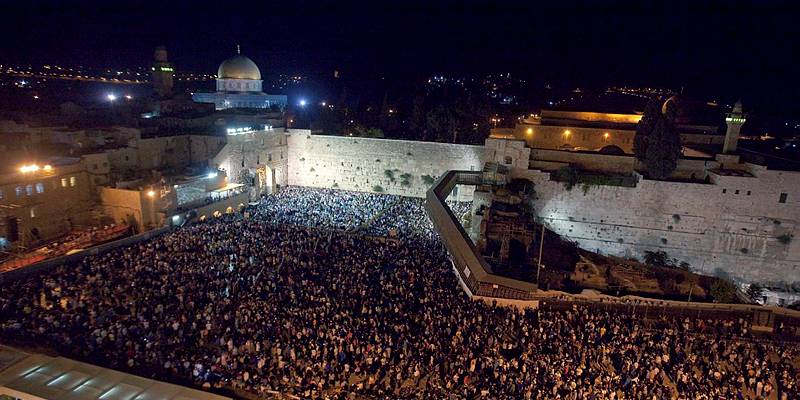Kol Nidrei, recited at the onset of Yom Kippur, in actuality has nothing to do with the holiest day on the Hebrew calendar. The haunting tune, however, is embedded in the Jewish soul.
By: Rabbi Ari Enkin, Rabbinic Director, United with Israel
With the recitation of Kol Nidrei, Yom Kippur, the Day of Atonement, is officially inaugurated.
All Torah scrolls are removed from the ark and then paraded around the synagogue for all to kiss. The Torah scrolls are then held by prominent members of the congregation for the duration of Kol Nidrei.
Perhaps the most anticipated selection from all of the Yom Kippur prayers is that of Kol Nidrei. Preparations for Kol Nidrei are somehow able to arouse an inexplicable sense of reverence and religious responsibility.
While many are not otherwise punctual when attending synagogue services, it seems that no one would chance missing the chanting of Kol Nidrei. One will note that it is the only nighttime prayer service of the year where a tallit (prayer shawl) is worn by adult male worshipers.
The most puzzling part of this, however, is that Kol Nidrei has nothing to do with Yom Kippur, nor even with prayer and repentance for that matter. Kol Nidrei is simply a Talmudic formula for the annulment of vows. Believe it or not, although Kol Nidrei is ancient, there have been numerous attempts to delete it from the Yom Kippur liturgy.
It is argued that justification for keeping the Kol Nidrei part of the service is to be found in the idea that one should not enter Yom Kippur with religious vows that one may have unwittingly made and left unfulfilled, as it would be unbecoming to approach God in such a state.
Additionally, non-fulfillment of vows is considered to be a serious violation of the Torah. With all this emphasis on annulling vows, Kol Nidrei also teaches us the power of speech.
Make no mistake, Kol Nidrei does not absolve us from our vows as they relate to personal commitments to our fellow man. Kol Nidrei relates only to religious vows made between an individual and God. We are still obligated to fulfill commitments made within the human sphere and to make proper restitution wherever those commitments cannot, for some legitimate reason, be fulfilled.
Interestingly, Kol Nidrei remains one of the few prayers recited in Aramaic. The reason could be that Aramaic was the vernacular language in the ancient Jewish communities of Babylonia, where the prayer was likely composed.
Some scholars argue, however, that the prayer finds its source in Spain and Portugal and that the words “we permit prayer with sinners” may be referring to the Marranos and Conversos (who converted under extreme duress to Catholicism). Yet other scholars have no idea at all where Kol Nidrei came from.
Regardless of the mysterious origins of this haunting prayer, combined with the many unsuccessful attempts to do away with it, we see that somehow Kol Nidrei has embedded itself in the soul of the Jewish people, as can be seen in the following story.
When Reb Leizer of Czenstochow walked out of the gates of Buchenwald, a Nazi concentration camp, he set out to find his youngest son, whom he had deposited with Gentiles for safekeeping. His first stop, of course, was to scour the monasteries, but that was unsuccessful.
Reb Leizer then decided to wander from village to village with an organ and to play his instrument in the marketplaces. As more and more children gathered to observe him, he would play Kol Nidrei. He would then observe their faces for any reaction.
If he saw recognition of the tune on the faces of the children, he would remind them that they were Jews and have them search out their parents and their faith.
According to the story, Reb Leizer never did find his son, but he helped dozens of Jewish children regain their connection to the Jewish people.

Do You Love Israel? Make a Donation to Show Your Support!
Donate to vital charities that protect Israelis and help inspire millions around the world to support Israel too!
Now more than ever, Israel needs your help to fight and win the war -- and also the battle of public opinion.
Anti-Israel bias and boycotts are out of control. Israel's enemies effectively use social media to incite brutal terror against innocent Israeli civilians. Please help us fight back!




